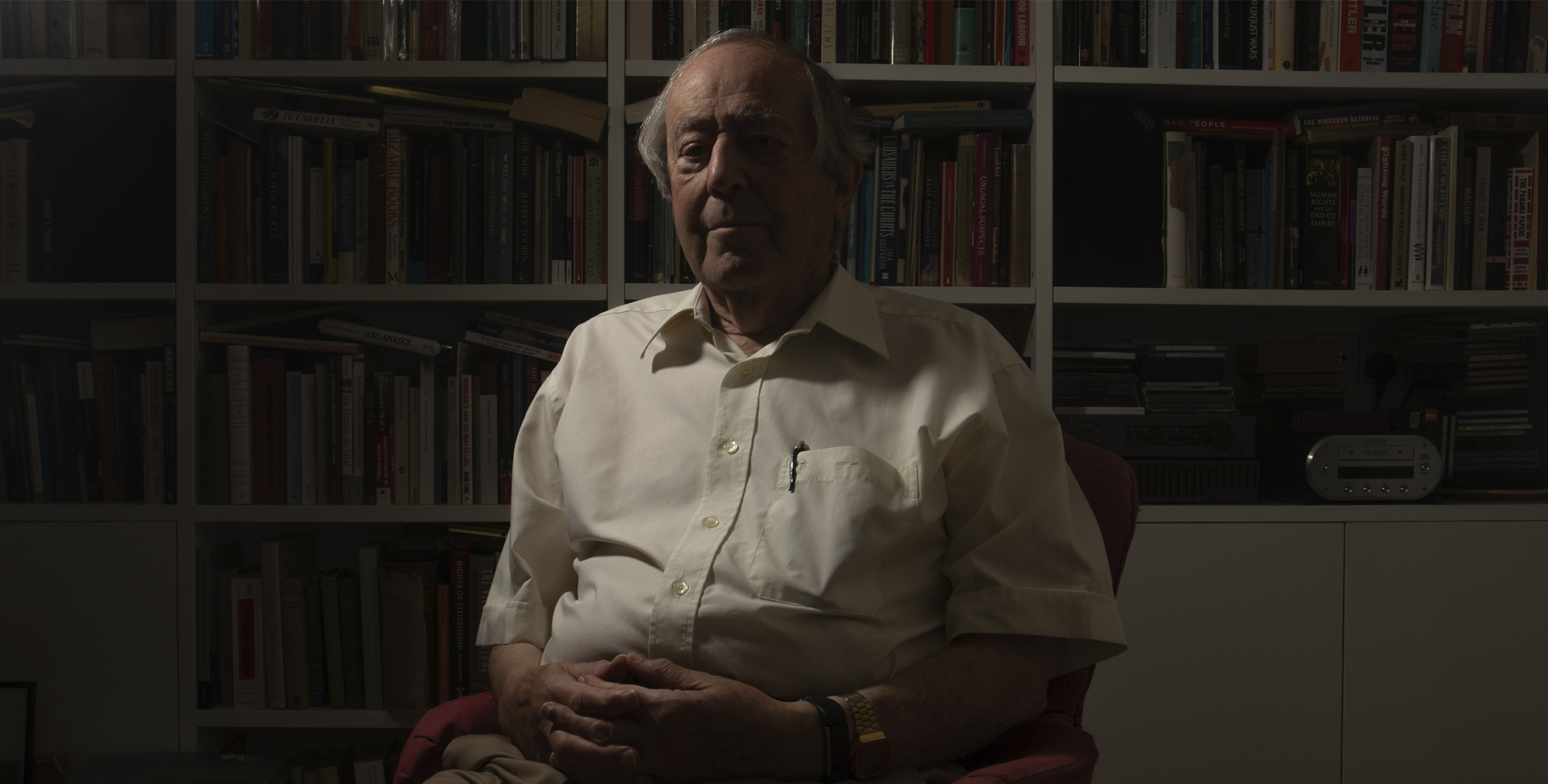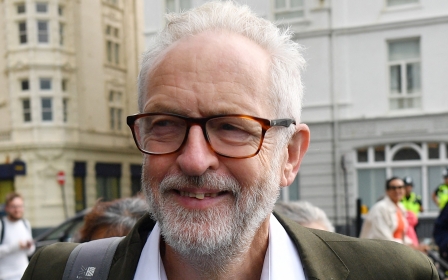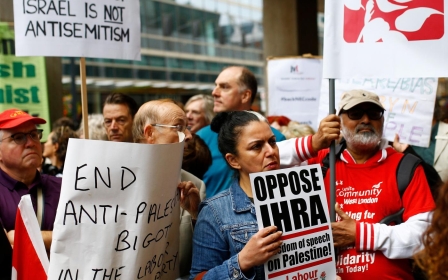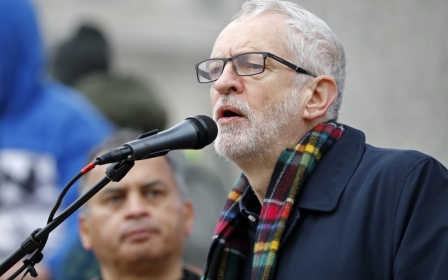Geoffrey Bindman on Labour's antisemitism scandal: 'There has been political manipulation'
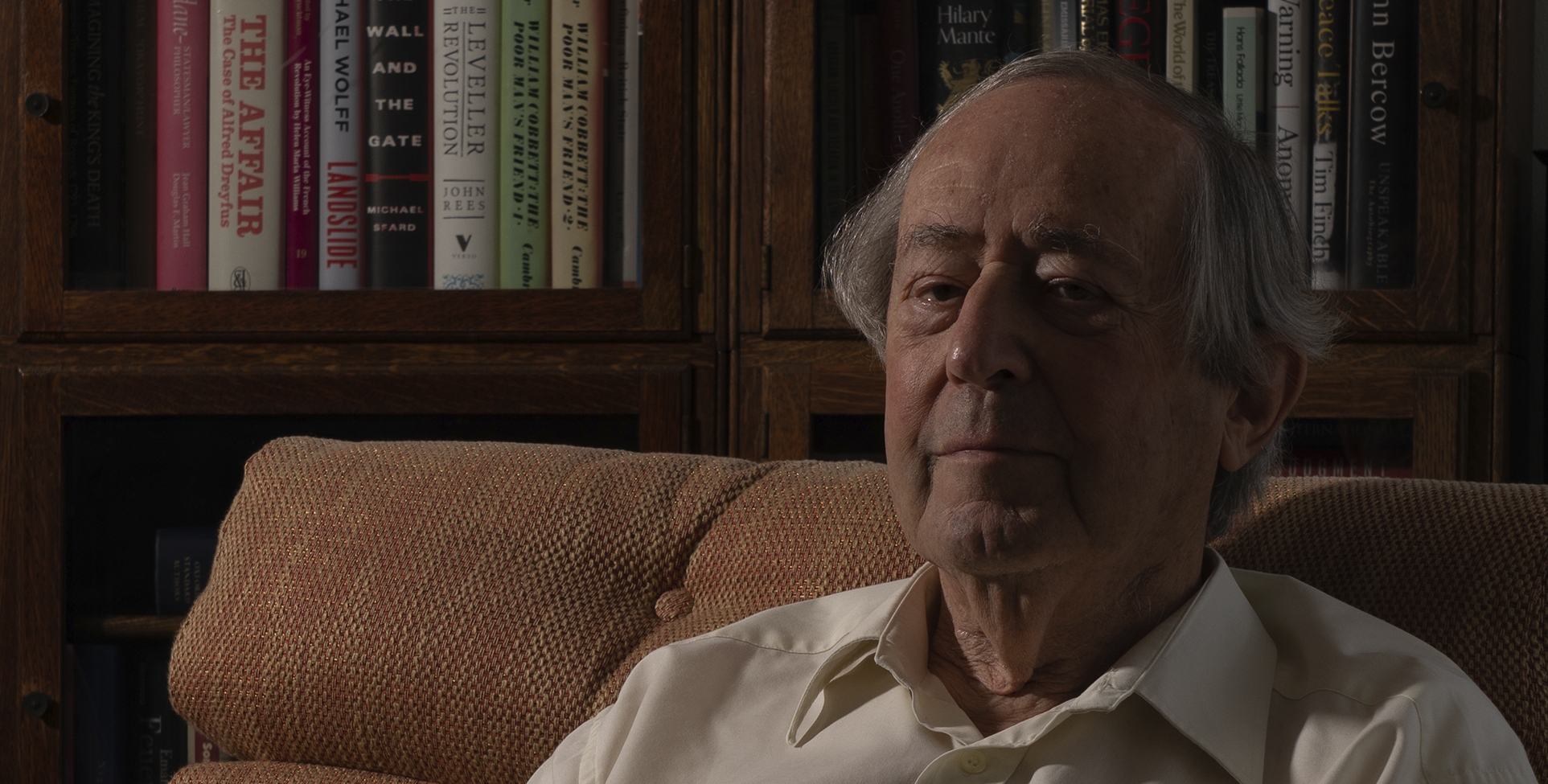
There are at least four reasons why Geoffrey Bindman should have a larger audience on the turmoil that is continuing to roil the Labour Party over claims of antisemitism.
He is one of Britain’s most distinguished lawyers in the field of human rights; he is himself Jewish and has experienced antisemitism personally; he has been a lifelong member of the Labour Party, and he is friends with the two main protagonists in this battle, the former leader Jeremy Corbyn, and his successor Keir Starmer, who has done so much to define himself against his former boss.
Claims of antisemitism against party members are, if anything, multiplying. Although this went on before Starmer took over as leader, the claims are being directed at Jewish members who criticise Israel, many of them members of Jewish Voice for Labour (JVL), of whom Bindman is himself a member.
JVL knows of 54 Jewish members of the party subjected to disciplinary proceedings in relation to allegations of antisemitism. Of these, 47 are full JVL members. All 11 of JVL’s executive committee have faced disciplinary action, nine of these in response to allegations of antisemitism.
As Corbyn’s shadow chancellor John McDonnell noted in a letter to Starmer and David Evans, Labour’s general secretary, that to be a member of JVL is to be 35 times more likely to be accused of antisemitism than any other party member.
New MEE newsletter: Jerusalem Dispatch
Sign up to get the latest insights and analysis on Israel-Palestine, alongside Turkey Unpacked and other MEE newsletters
Seven have been expelled, one reinstated. Fourteen have been auto-excluded over membership of “Labour Against the Witchhunt”, an organisation that campaigns against what it claims are politically motivated allegations of antisemitism, and was proscribed by the party last year. Some have been “punitively suspended” and others are on a “reminder of conduct”.
For Bindman, the whole process, particularly the referral of the party to the Equality and Human Rights Commission (EHRC), which found Labour to be in breach of the Equalities Act, has been mishandled.
“There was good reason to question the party's procedures for dealing with complaints of racial discrimination, including antisemitism, and they rightly agreed to change them. But there was no real evidence of the party itself breaking equality law,” he tells Middle East Eye.
“The worst part of it was that the party took it all lying down. Breaking the law is a serious matter. They accepted it when they should have challenged it.”
Experiencing antisemitism
But let’s go back to the beginning. What in Bindman’s eyes is antisemitism?
Bindman's definition is like that of the Oxford dictionary: “hostility or prejudice against Jews as Jews.”
“To me, that's what it is. Unfortunately, what has crept into the notion of antisemitism is the idea of hostility to the State of Israel, and that I think has been rather cynically developed by people who strongly support Israel, including the Israeli government itself, with the view to suppressing criticism of Israel's policies and treatment of the Palestinians.”
Bindman has not just studied antisemitism all his life. He has experienced it.
As a school kid in the northeast of Britain, antisemitism was common currency. It was taken for granted that Jews were a minority culture, generally to be disapproved of. “We were treated with suspicion and a certain amount of fear.”
Bindman in his childhood was very much part of the Jewish community, with a grandfather being a minister in the synagogue and undergoing intensive training for his bar mitzvah. In the Royal Grammar School in Newcastle, the Jewish boys did not go to prayers but were given a separate room of their own for worship.
Bindman’s separateness hit home when he started to take his first steps as a lawyer. He had met a senior partner in a leading firm of solicitors in Newcastle, who welcomed the promising Oxford graduate with open arms. He persuaded him to give up his pupillage at the Bar to become a solicitor in his firm.
Come September when he was due to start, Bindman’s uncle, himself a solicitor, asked: “Does he know you are Jewish?” The thought had not occurred to Bindman, whose family was well known locally.
“So just as I was leaving the office after a preliminary chat with my new boss, I said to him: ‘You know I’m Jewish, don’t you?’ And he said, and I remember his words: ‘Of course I knew. But since you have mentioned it, perhaps I ought to make one thing clear and this is you could never become a partner in this firm.’ I walked out and never saw him again.”
'If you look at the facts you can't justify what Keir Starmer has said or done unless he's using it as a pretext. A political strategy'
- Geoffrey Bindman
Bindman had already given up his student membership of Gray's Inn and had to pay a fee of £16 to do so.
“I've studied antisemitism a lot. We have very little of it now in the law. Pretty well all the barriers, the formal restrictions, the firms which excluded Jews altogether, of which there were a number, have gone. Since that time, I've rarely met serious antisemitism in my own daily life. But I'm very sensitive to subtle signs, like facial expressions of disapproval, which I interpret as antisemitic.”
Bindman has had an equally long history in the Labour Party, as a councillor, deputy leader of Camden council and chair of the Society of Labour Lawyers. He has acted for a number of leading figures in the party, although not Corbyn. “I have had close involvement with the Labour Party for many years, and I can say that I've never really experienced antisemitism among fellow Labour Party members or in Labour meetings.” He is not alone in this judgement.
The idea of any Jew being antisemitic is, in his words, “pretty hard to swallow”. Bindman does not deny that antisemitism exists in the party, as it does everywhere, but he agrees with Corbyn’s assessment in response to the EHCR report that the problem of antisemitism had been exaggerated - an assessment that got the MP expelled from the parliamentary Labour Party.
“He thought the problem had been exaggerated in the Labour Party. He did not say that antisemitism itself was not highly important, but he said there was not as much of it as had been suggested and he is absolutely right about that.
“You can look at all the statistics and studies that have been made. If you look at the facts you can't justify what Keir has said or done unless he's using it as a pretext. A political strategy. That’s all I can say.”
'Jeremy is not antisemitic'
As for Corbyn, Bindman is categoric in his judgment: “Jeremy is not antisemitic.”
Bindman defers to Geoffrey Alderman, in his recollection of Corbyn’s record of supporting the Jewish community in his constituency.
“In 1987 the West London Synagogue approached Islington Council with a startling proposal: to sell its original cemetery to property developers, destroying the gravestones and digging up and reburying the bodies lying under them,” Alderman wrote in the Spectator.
“This cemetery (dating from 1840) was not merely of great historic and architectural interest – in the view of Orthodox Jews, the deliberate destruction of a cemetery is sacrilegious. So when Islington Council granted the planning application, a Jewish-led and ultimately successful campaign was launched to have the decision reversed. I was part of that campaign. So was Jeremy Corbyn.
"Meanwhile, the then-leader of Islington Council (1982-92), whose decision to permit the destruction of the cemetery was eventually overturned, was none other than Margaret Hodge (though it is unclear whether she personally was in favour of the proposal).”
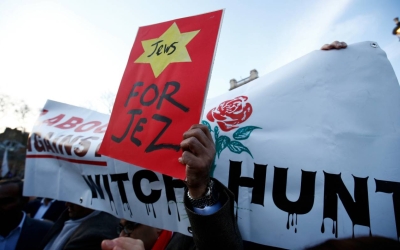
Corbyn never used this and many other acts he did for the Jewish community in his constituency to defend himself, a mistake for someone whose personal standing as leader was continually dogged by the unceasing allegation that he tolerated racism amongst his supporters.
The continual attacks on Labour members by the self-appointed gatekeepers on this issue, the Campaign Against Anti-Semitism, have since become too much even for Hodge, who played a central role in this drama.
In a furious row in the House of Commons in 2018, she confronted Corbyn behind the Speaker’s chair after a crunch vote on Brexit. She is reported to have told him: “You are a fucking antisemite and a racist. You have proved you don’t want people like me in the party.”
Those comments were protected by parliamentary privilege, but she then repeated the accusation of racism against Corbyn in an article for The Guardian. Corbyn did not defend himself either verbally or legally, rejecting the advice of his personal lawyer at the time to do so.
Today Hodge is attempting to call time on this campaign. She has had enough of the continual attempts to take down members of her party for antisemitism.
Following the group’s criticism of Starmer for using the Berlin Holocaust memorial in a political video, Hodge tweeted: “I’m fed up of CAA using antisemitism to attack Labour. Time to call them out for what and who they really are. More concerned with undermining Labour than rooting out antisemitism.”
Bindman says: “I like Jeremy tremendously. He's been a very good MP. No one challenges that. But he has his faults. And part of his problem is he's too honest and too decent to be an ideal leader. He's not tactical. He just says what he thinks, which gets him into trouble. And he never defends himself.”
EHRC: a botched investigation
But it is the decision by the EHRC to conduct an investigation that really fires Bindman up.
Bindman, who was involved in introducing anti-discrimination law as legal adviser to the EHRC’s predecessors, calls the body’s report “a very strange animal” and says the initial complaints are “nearly all baseless, as the EHRC itself found”.
The main type of illegal behaviour under the Equality Act is discrimination, which can either be direct or indirect, on racial or other listed grounds. Bindman agrees that racial grounds clearly covers antisemitism, subject to defining what antisemitism is. There are also subsidiary offences, including harassment linked to the prohibited grounds.
“Harassment must relate to a protected ground - in this case race or religion. The complaints, of which there were 200 or more, were nearly all about criticisms of Israel related to Palestine. All but four were rightly rejected, as the remainder should have been.”
The EHRC asked the Labour Party for documents pertaining to 20 people, all of them on the left. Corbyn complied. He also initiated his own inquiry which was meant to help the EHRC investigation and this was leaked.
Martin Forde, the barrister who was asked by Starmer to investigate the leaked report, drove a legal coach and horses through the contention, widely reported at the time, that Corbyn had intervened in the disciplinary process to protect friends.
'There's antisemitism everywhere, but it was wrong to single out the Labour Party, to single out Jeremy Corbyn'
- Geoffrey Bindman
Forde said that it is “entirely misleading” to imply that the leaked emails were evidence that Corbyn’s office was “inserting themselves unbidden into the disciplinary process for factional reasons”.
The leaked report was the most detailed investigation ever into the internal workings of a political party, running to 860 pages long and drawing on tens of thousands of internal emails.
But it was discounted by the EHCR. It acknowledged receipt of it, but the EHCR failed to ask for the annex, the documents and all the emails.
The EHCR made four findings of unlawful acts by the Labour Party. Two referred to Ken Livingstone and a local councillor. They were guilty of unlawful harassment, according to the EHCR, but the Labour Party was also responsible because they were acting as its agents.
Bindman brands this a “legal nonsense”.
“If they were agents, it means every member is an agent of the Labour Party. It made no sense. Those two findings made no sense.”
The other two findings were of indirect discriminatory practices, such as the alleged interference by Corbyn’s office in the conduct of complaints. “The evidence we’ve got from Forde says they were being asked by the body doing the investigation for help, they were responding much more than interfering. Insofar as they could be said to interfere, it was mainly to help to get the complaints expedited, not to influence the outcome.”
The other complaint which had been upheld was about training. “There was nothing to indicate discrimination in the training. There may have been bad training, but there was no evidence complaints about antisemitism were treated in a discriminatory manner.”
Bindman is unsparing in his conclusion: “I think there has been political manipulation and the allegations were almost entirely bogus. There's antisemitism everywhere, but it was wrong to single out the Labour Party, to single out Jeremy Corbyn, to start an investigation into the Labour Party.”
'Persona non grata'
There is a postscript to this sad story, and that concerns Bindman’s own relationship to Starmer. They have worked together over many years and know each other well.
Moreover, Bindman is not an unqualified Corbynista. Politically, he rejects a sharp left-right divide and he still finds it hard to hold Starmer personally responsible for all that has happened in the party.
Recently Bindman and Starmer bumped into each other and the two exchanged emails.
“He actually sent me an email a few months ago saying let's have a coffee. So I immediately replied saying name the time and place and I didn't hear any more from him. Then I saw him about six weeks ago. I said to him: ‘what's happened about our coffee?’ And he apologised and he said to me: ‘I don't have control of my diary’.”
Bindman has yet to hear from Starmer. “I actually have the feeling I am persona non grata.”
Middle East Eye delivers independent and unrivalled coverage and analysis of the Middle East, North Africa and beyond. To learn more about republishing this content and the associated fees, please fill out this form. More about MEE can be found here.


